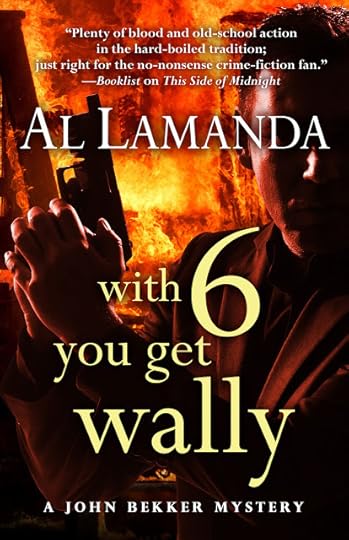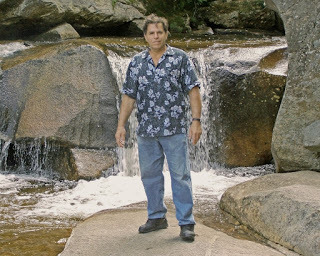An Interview with Al Lamanda author of "With Six You Get Wally"

For Sunset, my Edgar Award nominated mystery. " The latest from Lamanda is an exciting thrilled filled with tough but sympathetic characters who drag you breathlessly along to the final scene" Kirkus Reviewers.
For This Side of Midnight. (Nominated for the 2016 Nero Award) "For all his flaws, Lamanda's tough detective has his own moral compass, and his empathy and bulldog tenacity are as admirable as his bone-deep detective skills" Kirkus Reviewers
Interview with Al Lamanda
Question 1. How did you decide upon this career?
I think, as it happens with many career minded people, the career picked me. Almost a calling, if you will. I was eleven or twelve and began to read seriously for the first time. It was as if an entire new world opened up to me. Jules Vern took me to faraway exotic places and Zane Grey transported me back in time to the old west and all this happened without having to leave my bedroom. It fueled my imagination and the desire to create my own stories that, hopefully, would touch people the same way. I’ve since interviewed doctors, police officers and even priests while conducting research and many if not all share similar experiences, that at a young age they simply felt a calling.
Question 2. What was the path you took to your current career?
It’s called the long and rocky road. Writing is an art form and like any other art form it takes years in time and experience to perfect. It’s not much different than say acting, painting, dancing or singing in that regard. After twenty years of grueling dedication to perfecting your craft, you’re suddenly an ‘overnight sensation.’ At an early age, I knew what I wanted to be, but I lacked the life experience to do it. I worked many different jobs as a young man and gained knowledge and experience from all of them. I was in the Marine Corps and that experience is something I still draw upon today. My path took a turn for the better when, after many years of gaining knowledge and experience in life, I was able to put feelings into words. If Hemingway had not driven an ambulance during World War One, would he have written A Farewell To Arms? If I had not failed and succeeded at many things, met many different types of people and lived in many places, I doubt I would be successful at what I do today.
Question 3. How do your values and ethics impact your current career?
Pretty much one hundred percent. My values and ethics are directly reflected in the stories that I write. I believe that good will always triumph over evil. It may take a while and some good guys may die along the way, but in the end evil will be vanquished. I place a high value on family and friends and this is also a big part in my stories. I lived the ‘No Man Is An Island’ rule and can tell you firsthand that without a strong support network of family, friends and coworkers, your career path will be much more difficult. My mystery and western novels directly reflect the values I believe in and I generally try to show the strength of the characters as they face adversity and hardship in their journeys. My characters usually have to come face-to-face with their own ethics and must decide what is right and what is wrong in their lives and this is something I have had to do many times in my own life. It’s all part of that ‘rocky road’ I mentioned earlier.
Question 4. How do you balance the demands of your current career with the other areas of your life?
This is a question I’m asked quite a bit, mostly by young writers just starting out and some veterans who find it difficult to juggle many different hats. The answer is actually hidden in the question in the words ‘balance the demands.’ Easy to say, difficult to accomplish. As with most careers, especially when just starting out, you want to make your mark in the world and show you’re worthy of the trust placed in you. Longer hours at work become midnight burners and family, friends, social life and outside interests become neglected. This is a very unhealthy trap to fall into, both mentally and physically. For a while I fell into this trap myself and it’s not so easy to climb out of. Work and career can become all consuming if left unchecked. I had to learn to prioritize, create a balance of work, family and friends, a social life and outside interests. There is some discipline involved in this juggling act for it to be successful. When I’m working, I’m totally dedicated to the task at hand. I set a time limit of say six o’clock to quit for the day and then it’s fun time, time for family, friends and social activities and I’m as equally dedicated to that as well. By prioritizing my work with all the other areas in my life, I have become what I consider a well-rounded person.
Question 5. What habits as a student did you carry over to the working world?
Many. For me, college was a shock compared to high school. No parent to make sure homework was complete is one big change that can take some getting used to. You either study on your own and do the required work, or you don’t. If you don’t, you fail. It’s all on you. I had to learn discipline, something I sorely lacked. I learned quickly, though, that it does require discipline to study alone in your room when it’s much more fun to hang out with your buddies. Multitasking is another habit I learned as a student. The ability to study more than one topic at a time and do well with all of them. This is one habit you best acquire early and draw upon for the rest of your life as there will be very few days in which you will do only one thing in an entire day. Another habit I acquired as a student was to do research. This habit has not only stayed with me, but is vital in my work as a writer. Equally as important is perseverance. To stick with a course when it’s easier to give it up is a habit and a trait that stays with you forever.
Question 6. What are your typical daily activities?
As a writer I am my own boss so to speak. Here is where many of the habits I acquired as a student come into play. I’m usually out of bed and after a gallon of coffee, am in my home office by nine and ready to work. If I am working on a book, which I always seem to be, I read and edit what I wrote the day before. This sometimes takes two hours or more and requires patience and discipline because the urge to turn the page and write something new is always tugging at me. When the editing is done, I’ll generally write for about two hours before I break for lunch. Then I write at a steady pace until five in the afternoon. At five, I force myself to stop and stopping requires just as much discipline as starting. From five until six I do whatever research is necessary for tomorrow’s writing. At six o’clock, I’m on my own time. I take weekends off and I usually make time to go to the gym at least three times a week. Keeping your body fit helps to keep your mind sharp. Generally speaking, most of the habits I acquired as a student are used everyday as a professional writer.
Question 7. What do you like most about the job? What do you like least? Why?
Hands down the best part of my job is the creativity. Creating characters, plots and story and tying them all together into a book is a joy for me. What I like least is dealing with the ‘Boss’, the editors. An editor is there to make your book a better book and in doing so they look at every word, comma, period and paragraph. They cut some of your favorite paragraphs and request you add more someplace else. Here is where discipline and patience come into play. The editor, like any good boss is there to help make your work better. Unfortunately, some never fully grasp that and that lack of understanding usually leads to failure.
Question 8. What important changes are taking place in your profession?
Without a doubt the most important change happening in the publishing world as well as all communication is technology in the form of the Ebook. Now that being able to read a book on line is here to stay, and believe me it is, it has changed the habits of the reading world. In my opinion this is good and bad at the same time. Good because it has gotten more people to read. Bad because the product has become watered down.
Question 9 How will these changes affect your writing.
Writing is simply communicating and the way we communicate today is vastly different than even fifteen years ago. Look at a movie from say the late nineties. If someone had a cell phone it was the size of a football and a computer took up an entire desk. Pay phones were still widely in use and the word text had an entirely different meaning. Technology has advanced so much in the last decade it’s difficult to keep up with. For me as a writer, I needed to learn to adapt to these changes and use them as tools to better my profession. I believe anybody in communication in today’s world has to do the same thing.
Question 10. What advice can you offer someone seeking to break into the field.
Remember the basics of what you learned as a student. Dedication, perseverance and discipline are key ingredients to a successful career. Be willing to change and learn new things. We don’t live in a stagnant world. The way we communicate today will probably be as different in the next decade as the way it was twenty years ago. Remember patience. It can take a long time to become an ‘overnight success.’ Think of it as a journey through life because that’s what it really is. Be honest. Be kind. And don’t forget to enjoy yourself along the way.

Author Bio
Al Lamanda was born in The Bronx, New York and lived most of his life in Manhattan. His debut novel Dunston Falls received high praise from Kirkus and Publisher's weekly and from there he was hooked, writing more than twenty novels and several screenplays. Nominated for the 2016 Nero Award for best mystery for This Side of Midnight. Nominated for the 2015 Nero Award for best mystery novel for First Light. Nominated for The Edgar Award for best novel for Sunset, 2012. Look for the sequel Sunrise in summer 2013. Voted the best crime novel of 2013 for Sunrise by the Maine Writers and Publishers Alliance. In his spare time Al Lamanda is an avid weight lifter and boxer and housemaid to his Maine Coon Cat. Coming in 2016 With Six You Get Wally, a new John Bekker mystery.
Published on July 15, 2016 14:53
No comments have been added yet.



